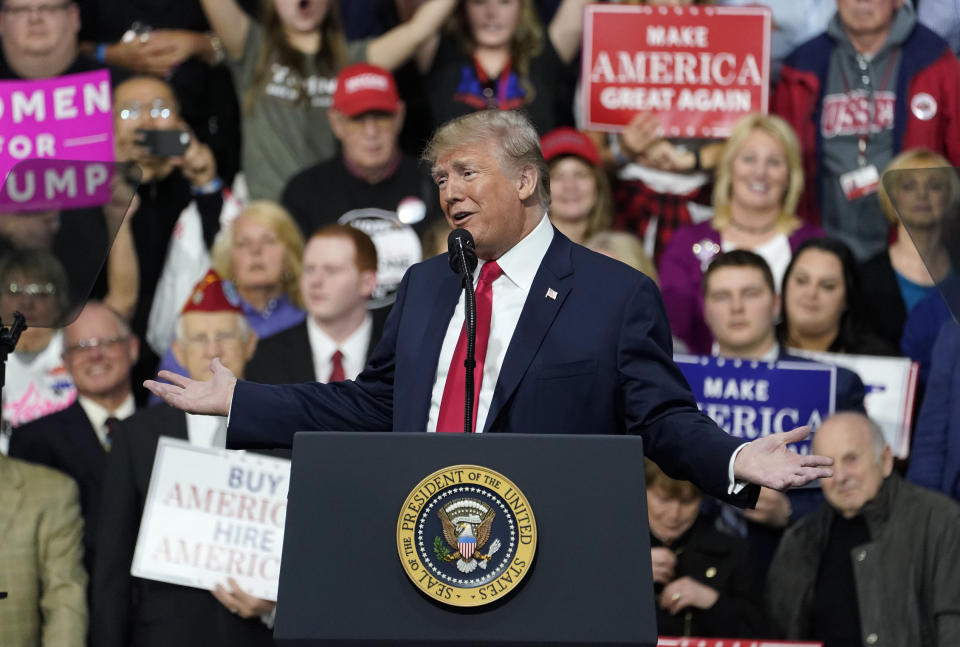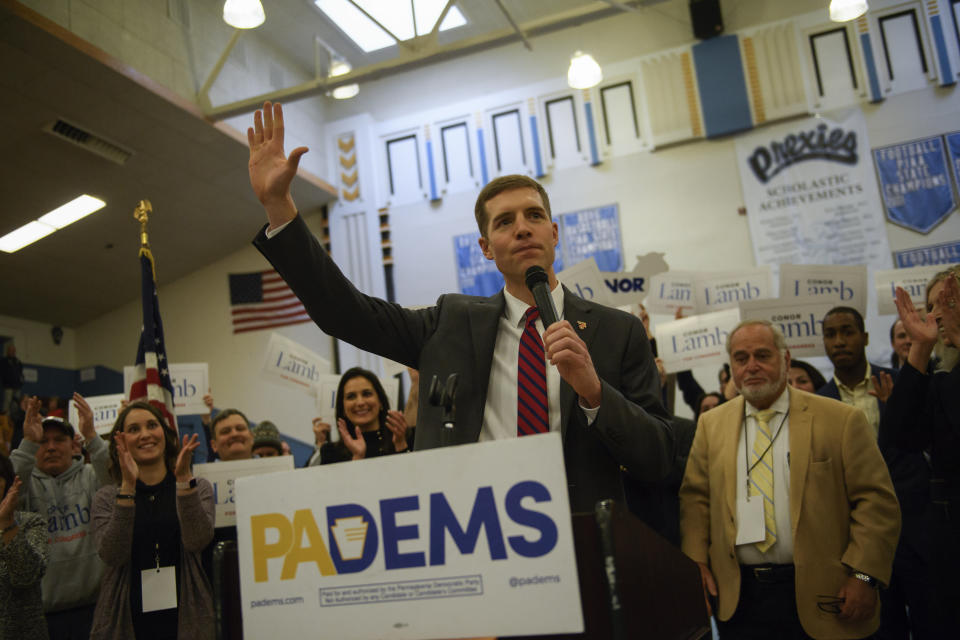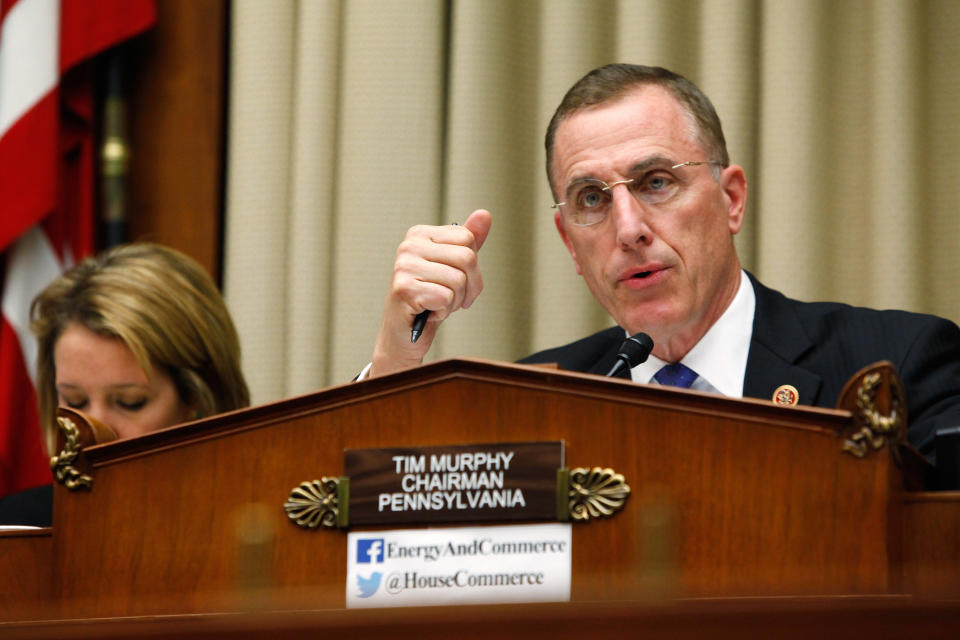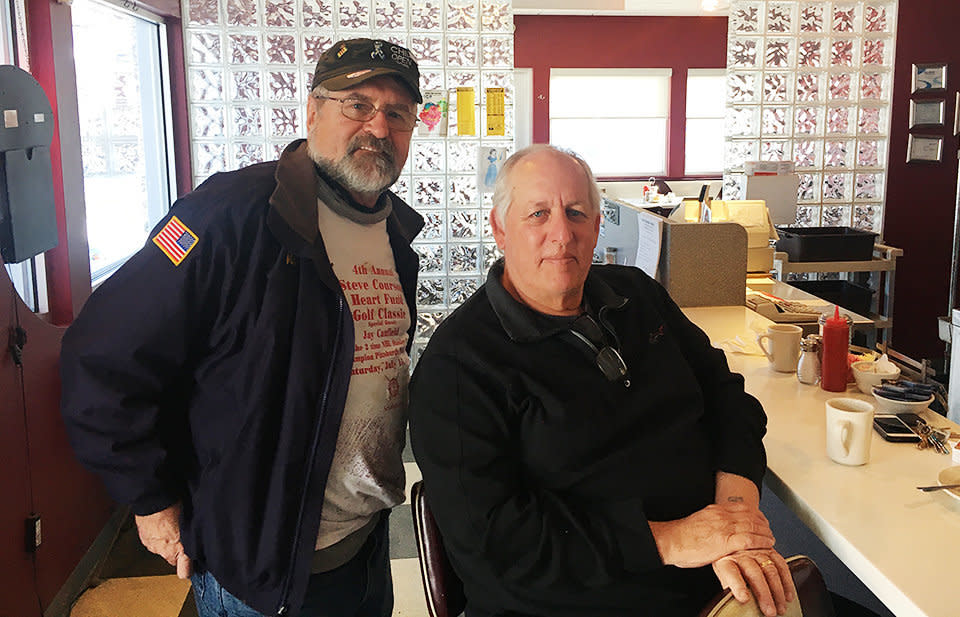Republicans Steel For A Loss In Trump Country Special Election
WASHINGTON, Pa. ― Dwight Harris, 40, is a registered Republican who enthusiastically voted for Donald Trump and is largely satisfied with the choice he made.
Harris, a second-generation coal miner tired of people who feel “entitled” to government handouts, is exactly the kind of voter that Republican congressional candidates need to count on in a difficult election year.
But when a canvassing team from the United Steel Workers labor union knocked on Harris’ door on Thursday afternoon, Harris let them know that he was already planning to vote for Democrat Conor Lamb in Tuesday’s special congressional election.
The reason was simple: His union, the United Mine Workers of America, had informed him that Lamb supports bipartisan congressional legislation to plug the hole in the union’s troubled pension fund.
Republican Rick Saccone, on the other hand, “won’t even talk to our union at all about the pensions or anything,” Harris said.
That left Harris no choice but to go with Lamb, with whom he disagrees on other issues. “I can’t cut my own throat,” he said.
Attrition from union members like Harris is part of a perfect political storm brewing for Republicans in Pennsylvania’s 18th Congressional District, where over 80,000 people ― from more than one-fifth of households ― belong to unions. Unions, many of which have endorsed the district’s Republican candidate in the past, have mobilized in full force against Saccone, whose anti-union record includes support for right-to-work laws.

Along with union drop-off from the GOP, higher than normal Democratic enthusiasm, suburban moderate voters’ frustration with the president and an especially weak Republican candidate have converged to endanger the GOP hold on a favorably gerrymandered district that Trump won by nearly 20 percentage points in 2016.
The GOP-held seat, which stretches from the suburbs of Pittsburgh to rural coal country on the border with West Virginia, came up for grabs after eight-term Republican Rep. Tim Murphy resigned in October. (The anti-abortion rights congressman was caught urging a woman with whom he was having an extramarital affair to get an abortion.)
On paper, the special election will have a limited impact on the balance of power in Congress. Pennsylvania’s Supreme Court redrew the district boundaries in February, enabling Lamb to run again in November in the new 17th Congressional District, which went for Trump by just 3 points.
However, even a temporary victory in solid red territory would devastate Republican morale and turbocharge Democratic enthusiasm ahead of the midterm elections. It would signal that no district is safe from the political blowback to Trump’s presidency and diminish his political capital in Congress.
As a result, national Republican groups have gone all in to prop up Saccone’s campaign, spending millions of dollars on television advertisements, direct mail literature and field canvassers.
But in spite of outside spending that was at one point 17 times greater than that of Democratic groups, Saccone and Lamb are neck-and-neck in the few available public polls of the race.
Trump, recognizing he will get some of the blame if Saccone loses, has tried to engineer a last-minute turnaround for the flagging candidate. He held a packed rally for Saccone at the Pittsburgh airport on Saturday night where he nicknamed the Democratic contender “Lamb the Sham.” Trump has since been admonishing his followers on Twitter to turn out for Saccone, who will be “much better for steel and business.”
The Pittsburgh Post Gazette just endorsed Rick Saccone for Congress. He will be much better for steel and business. Very strong on experience and what our Country needs. Lamb will always vote for Pelosi and Dems....Will raise taxes, weak on Crime and Border.
— Donald J. Trump (@realDonaldTrump) March 12, 2018
The Republicans are 5-0 in recent Congressional races, a point which the Fake News Media continuously fails to mention. I backed and campaigned for all of the winners. They give me credit for one. Hopefully, Rick Saccone will be another big win on Tuesday.
— Donald J. Trump (@realDonaldTrump) March 11, 2018
Even Trump’s recently announced steel and aluminum tariffs were conveniently timed to coincide with an election in a region where the steel industry is embedded in the local DNA.
But on the eve of the election, it appeared that not even Trump’s visit was enough to give Saccone a boost. Lamb’s lead over Saccone grew to six percentage points in a new Monmouth University university poll released Monday. The poll assumes higher-than-normal Democratic turnout, which would be consistent with recent elections in Alabama and Virginia.
Republicans insist that Saccone’s struggles are not a reflection of the unpopularity of Trump or congressional Republicans and their policies. For the most part, GOP officials have instead laid the blame squarely on Saccone, a 60-year-old state lawmaker, political science professor and former military intelligence officer with a deeply conservative voting record and dry speaking style.
“Candidates and campaigns matter and that’s why it’s a race,” said a national Republican operative active in the race who asked not to be named. “You have one candidate that’s out of central casting, Conor Lamb, and then you have a candidate on the Republican side, who, it was expected, would be lackluster in fundraising.”
Indeed, as of Feb. 21, Saccone had raised just over $900,000, compared with Lamb’s $3.9 million haul.
But Super PACs and the national GOP have more than closed the gap for Saccone. The Congressional Leadership Fund, a super PAC aligned with House Speaker Paul Ryan (R-Wis.), has spent $3.5 million, as has the National Republican Congressional Committee, the party body that helps elect Republicans to the House. Three other Republican super PACs spent a combined $1.7 million on ads, and the Republican National Committee chipped in $1 million on field organizing and campaign literature.
But the outside groups’ dollars do not go as far on the airwaves. Media outlets are only required to give candidates themselves the lowest possible television and radio advertising rates, and outside spending often lacks the focus and coordination of a campaign’s efforts.
“When candidates don’t raise as much in hard dollars, it’s very difficult to run these things from afar,” said Mike DeVanney, a Pittsburgh-based Republican political consultant.
Other Republicans have noted the amateurish nature of Saccone’s media and field operations, including goofy Facebook Live broadcasts. White House adviser Kellyanne Conway’s visit with campaign volunteers last Thursday drew fewer than 20 people, according to The Associated Press. On another occasion, the AP reported, Saccone himself failed to arrive as promised for a canvassing event with supporters in Greensburg.
Saccone’s lavish use of his expense account at the state legislature has also become fodder for attack ads.
Lamb, a 33-year-old Marine veteran and former federal prosecutor from one of Democratic Pittsburgh’s most prominent families, was the perfect foil. His background, devout Catholic faith and more conservative positions on guns (he opposes new regulations), coal and fracking (he considers them part of the country’s “energy future”) made it harder to peg him as the kind of urbane liberal that instinctively repels the district’s considerable share of blue-collar voters.
On the divisive issue of abortion rights, Lamb has said that he personally believes that “life begins at conception.” But he does not back additional restrictions on abortion, including a ban on the practice 20 weeks into a pregnancy.
Lamb courted moderate and independent voters with his opposition to a brief government shutdown in January, as well as pleas for bipartisan fixes to the Affordable Care Act and the nation’s infrastructure. And in a region ravaged by the opioid epidemic, he promised to continue prosecuting drug dealers, including “those in white lab coats,” as he put it in one piece of campaign literature.
It’s tempting to see in Lamb a kind of Pittsburgh-area version of Jon Ossoff, the young and clean-cut fiscal moderate whose failed special election bid for a suburban Georgia congressional district in June attracted astronomical national funds and attention.
But notwithstanding the endorsement of the economically centrist Blue Dog PAC, Lamb has run on what can best be described as a pro-union, liberal populist platform. At virtually every campaign event, Lamb expresses a reverence for union workers and their priorities that is matched only by his solemn respect for his fellow military veterans. And in keeping with the region’s mythic United Steel Workers union, Lamb immediately voiced qualified support for Trump’s tariffs on steel and aluminum.
Lamb has also run heavily on protecting Social Security and Medicare, a fact he touted in an ad denouncing those who call the social insurance programs “entitlements,” rather than earned benefits. In a questionnaire for the progressive advocacy group Social Security Works PAC, Lamb endorsed expanding the two social insurance programs. He also wants to empower Medicare to negotiate lower prescription drug prices.
“Lamb’s run a pretty good race,” said a western Pennsylvania GOP strategist who asked not to be named for professional reasons. “Had he been willing to be more moderate on abortion, it could have been really helpful for him.”
Love HuffPost? Become a founding member of HuffPost Plus today.

Notwithstanding Lamb’s adroit political balancing act, Saccone and Republican groups have bent over backwards to portray him as an out-of-touch liberal, rather than focus much on the GOP candidate’s merits or policies.
They have tried desperately to tie Lamb to House Minority Leader Nancy Pelosi (D-Calif.), whom Lamb said he would not back as Democratic leader. In a bid to find something that would stick, Republican groups went on to rip Lamb’s opposition to the GOP tax cut bill, cast doubt on his prosecutorial record and even tried to confuse liberals with mailers touting Lamb’s opposition to expanded gun reforms.
If Lamb wins, said Devanney, “it’s an inflection point. It’s an opportunity for the party to examine what’s happened.
“We’ll be able to look at the playbook and see if running against Nancy Pelosi and Barack Obama still works,” he added.
In conversations with voters across the district, there were already signs that the negative playbook was backfiring.
“I’ve been getting some nasty stuff from Saccone about Lamb,” said Bonnie Schrader, a 54-year-old independent who voted for Murphy but is now backing the Democrat. “I’ve heard more bad stuff from him than any good stuff that he’s planning on doing.”
Pelosi “has nothing to do with” the race, she added. “She’s already in there.”
Also on HuffPost
Conor Lamb Nomination

Saccone Greets Trump

Tim Murphy




"I just wanted to let you know: Get in there and get him out. Cuss if you don't do it. I'm coming down myself," Skowvron said. "The way Trump talks to people, the way he's treating the world ... He's ruining the country," Skowvron added.

Trump performed well in the area because young people supported him, according to Nakoneczny. "They're tired of all these promises," he said. "Everybody's promising 'em, nobody's ever doing nothing."
Nakoneczny continued: "As much as Trump sucks, he's telling you, 'I'm putting yinz first. I'm doing what you wanna do.' But he's not doing it the right way, ya know what I mean?"

"I'm like, 'You know what: Let somebody in who's been in business that seems to know what he's doing because he's not broke," she recalled. But Dhanse has heard that the GOP tax legislation is "not gonna really do much for the middle class."
"The people that make a million dollars, they should be able to give a little more to make businesses give raises. People can't live on $7.25 an hour," Dhanse added. "And the minimum wage hasn't changed for how long? Thirteen years or something like that."
![Wes Donahoe, 29, is a medical equipment repair specialist in Jeannette, Pennsylvania. He voted for Libertarian Gary Johnson in the 2016 election and didn't know enough about the special election candidates to decide how he would vote. But he is pretty satisfied with President Donald Trump, including the tax cut bill, which he believes will help him and most people in the middle class. <br /><br />At the same time, Donahoe said the corporate tax cuts will probably not prompt companies to create new jobs. "Just because a company is getting more tax breaks doesn't mean that there's more demand for [their] production or service or anything," he said.](https://s.yimg.com/ny/api/res/1.2/q0FW05TcR9jG8482WFiJGw--/YXBwaWQ9aGlnaGxhbmRlcjt3PTk2MA--/https://img.huffingtonpost.com/asset/5a6237291e000028005add63.jpeg)
At the same time, Donahoe said the corporate tax cuts will probably not prompt companies to create new jobs. "Just because a company is getting more tax breaks doesn't mean that there's more demand for [their] production or service or anything," he said.

Lintz, a lifelong Democrat, voted for Barack Obama but left the top of the ballot blank in 2016. He said he would have rather voted for Mickey Mouse than either Hillary Clinton or Donald Trump. "I don't think there is a party for working people any more," he said. "They're all the same. Call it Republicats and it would be right now."
Hearing Lintz opine at the McDonald's in Burgettstown, Pennsylvania, Don Dowler, 72, walked over. Dowler, a retired union member, voted for Donald Trump in 2016 and is inclined to vote Republican in the special election. But if Dowler heard the Republican candidate is anti-labor, he said, "That might affect me, yeah. It depends which way he goes."
This article originally appeared on HuffPost.

